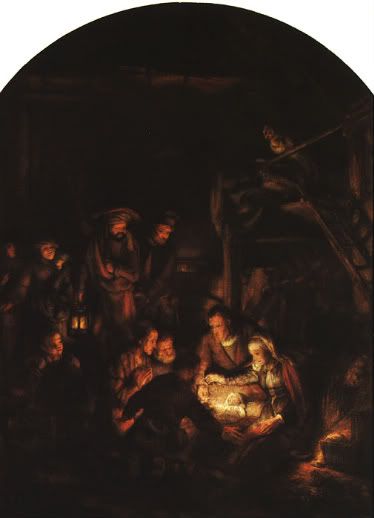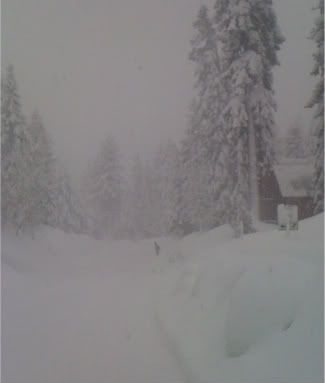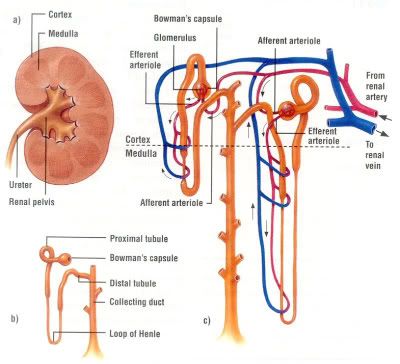
The mystery of the humanity of Christ,
that He sunk Himself into our flesh,
is beyond all human understanding.
- Martin Luther (H/T: T19)

The mystery of the humanity of Christ,
that He sunk Himself into our flesh,
is beyond all human understanding.
- Martin Luther (H/T: T19)

. . . He took to Himself a body, a human body even as our own. Nor did He will merely to become embodied or merely to appear; had that been so, He could have revealed His divine majesty in some other and better way. No, He took our body, and not only so, but He took it directly from a spotless, stainless virgin, without the agency of human father - a pure body, untainted by intercourse with man. He, the Mighty One, the Artificer of all, Himself prepared this body in the virgin as a temple for Himself, and took it for His very own, as the instrument through which He was known and in which He dwelt. Thus, taking a body like our own, because all our bodies were liable to the corruption of death, He surrendered His body to death in place of all, and offered it to the Father. This He did out of sheer love for us, so that in His death all might die, and the law of death thereby be abolished because, when He had fulfilled in His body that for which it was appointed, it was thereafter voided of its power for men. This He did that that He might turn again to incorruption men who had turned back to corruption, and make them alive through death by the appropriation of His body and by the grace of His resurrection. Thus He would make death to disappear from them as utterly as straw from fire.- St. Athanasius (293-373 A.D.), from On the Incarnation
In the quote below Lars Levi Laestadius, the great Swedish Lutheran revival leader, expresses the hope of the repentant sinner, that they would see "the Lord's Christ." Laestadius here must be taken to mean that the repentant who desire a savior will see Christ spiritually in this life when God gives them the grace to believe on Him. It is not that he was speaking of the time when all will see Christ at His return to judge the living and the dead. This is clear because near the end of the quote he speaks of those few who already "have seen Christ." As is often the case with Laestadius, perhaps because of poor translations, there is a sentence which I don't understand which reads, "They must also come into the temple through the effect of the Spirit, in that covenant when the Lord's Christ is carried in there." It is obviously a reference to Simeon being in the Temple and Christ being carried there by His parents but I'm not sure how it applies to the individual believer today.
But, on the whole, I felt that this was a good Advent quote and also appreciated the fact that he mentions one of the verses from Job I wrote about in my last post.
Then with better confidence than before he can say to the servant of self-righteousness, "I know that my Redeemer liveth, and that He shall stand at the latter day upon the earth: And though after my skin worms destroy this body, yet in my flesh shall I see God." And as that saint Job had received that blessed assurance, that in his flesh he shall see God, so also old Simeon had received that assurance from the Holy Spirit that he should not taste death before he had seen the Lord's Christ. And the same assurance is given even yet to all the sorrowful, penitent, and doubting souls who await the Consolation of Israel that they shall see the Lord's Christ before they leave the world. But in that seeing is needed the same kind of patience in tribulation as Job, the same kind of waiting and longing after the Lord's Christ as Simeon, for no one can receive that assurance from the Holy Spirit that he shall see God in the flesh, who has not awaited the Consolation of Israel in sorrow, penitence, and faith. And those few souls who await the Consolation of Israel in spiritual poverty, and who have the heartfelt desire that they can see Christ before they die, will soon receive that blessed assurance from the Spirit that they will not taste of death before they have seen the Lord's Christ in the flesh. They must also come into the temple through the effect of the Spirit, in that covenant when the Lord's Christ is carried in there. You sorrowful, penitent and doubting ones, have you waited a long time in spiritual poverty for the Consolation of Israel? Have you received that assurance from the Holy Spirit that you shall see Christ? And you few souls who have seen Christ and carried Him in your arms, pray as old Simeon, "Lord now lettest thou thy servant depart in peace, according to thy word: For mine eyes have seen thy salvation, which thou hast prepared before the face of all the people. A light to lighten the Gentiles, and the glory of thy people Israel." Hear thou Consolation of Israel, the sigh of all the sorrowful, penitent, doubting and believing.
- Lars Levi Laestadius from his Sermon No. 65B from his Kirkkopostilla 1876
I know that my redeemer lives
-Job
To inaugurate what may be the last real Christmas Break of my life I headed up with some friends to Mammoth Mountain for a weekend of snowboarding. Mammoth is high in the Sierra Nevada in central California and is the most impressive ski resort I've ever seen. We got a good deal on a slopeside condo and our plan was to snowboard all day Saturday and Sunday. Four-and-a-half hours north of Loma Linda we drove into heavily falling snow in Mammoth Lakes, California as we arrived at the condo. The next morning we arose early to be the first on the lift to snowboard down untracked powder. The chest-deep powder was a challenge that morning but as the runs became more tracked-out and I adapted to the powder the day turned into an excellent day of snowboarding. The snow did not quit falling that day and fell all night Saturday night. When we headed up the slopes again Sunday morning we found that only two of the twenty-eight lifts were open because of wind and snow. It turns out that the storm we weathered in Mammoth has been part of the snowiest December ever recorded there (since record-keeping was started in 1969.) Between Friday and Sunday when we left the storm dumped 6 to 10 feet of snow.
I forgot my camera but snapped a few photos on the way out of town with my iPhone:



Digging one of our cars out of the snow.
After a full day of snowboarding Saturday we gathered, a group of 10, for a time of devotion, focusing on Old Testament prophecies concerning the incarnation, life and atoning death of Jesus Christ. We also read the Christmas story from Matthew and Luke. Some of the prophecies we read and meditated on were very familiar to me such as that from Genesis 3:15, ". . . he shall bruise your head, and you shall bruise his heel," and those from Isaiah and Micah. But I had not realized that the Book of Job also contains some words which seem to be Messianic in character. And certainly commentators such as Wesley and Matthew Henry saw some of these words as directly prophetic concerning Christ. It was Job 9:32-35 which especially affected me. In this section Job expresses his desire for an Arbiter between him and the holy and seemingly unapproachable God of the universe. As Job expresses his desire he says, "There is no arbiter between us, who might lay his hand on us both (9:33)." Job confesses his need for an Arbiter between himself and God, the need of every sinner. But Job does not stop here. In 16:19 he confesses his hope that he does indeed have a "witness" in heaven, "Even now, behold, my witness is in heaven, and he who testifies for me is on high." In this verse Job seems to fit with the Old Testament saints mentioned in Hebrews 11 where the author of that book writes, "These all died in faith, not having received the things promised, but having seen them and greeted them from afar, and having acknowledged that they were strangers and exiles on the earth (11:13)." Therefore, from afar, Job sees and greets the One who is his Arbiter and Witness in Heaven, the Lord Jesus Christ, who is the "one mediator between God and men (1 Tim 2:5)." Later, in a statement that in my opinion points to Christ's incarnation and Job's eventual resurrection, (although the text note in my ESV Study Bible doesn't jump to that conclusion as it says, "Because of Job's earlier laments and the difficulty of the Hebrew in v. 26, interpreters have questioned the likelihood that Job is expressing in these verses a belief that God will redeem him after death."), Job wonderfully proclaims, "For I know that my Redeemer lives, and at the last will stand upon the earth. And after my skin has been thus destroyed, yet in my flesh I shall see God, whom I shall see for myself, and my eyes shall behold, and not another (Job 19:25-27a)." Job knew that he would, in the flesh, see his Redeemer, the One who said, "Whoever has seen me has seen the Father (John 14:9b)."
Job's desire for an Arbiter between himself and God, one who could, "lay his hand on us both," reminded me of something I had just read from St. Irenaeus last week. He wrote, concerning Christ:
[In this way] He attached and united man to God. Had man not vanquished the enemy of man, the enemy would not have been justly vanquished. On the other hand, had it not been God who granted salvation, we could never have possessed it securely. And if man had not been united to God, he could never have become a partaker of incorruptibility. It required the Mediator of God and men, through His kinship with both, to bring back both to friendship and concord, presenting man to God, revealing God to man.
During Advent as we prepare to celebrate the Incarnation of our Lord and also look forward to His glorious Parousia, it is good to be reminded of the necessity of God the Son becoming fully and truly man to redeem sinners. Christ's Incarnation was not some arbitrary choice of God in determining how He would save sinners but it was necessary and the only fitting manner in which God would accomplish His sovereign purpose.
When I arrived back in Loma Linda I opened my copy of Pascal's Pensées, which I had recently purchased and came across a quote which fit very well with our recent devotional time focusing on the prophecies concerning Christ. Pascal wrote:
If a single man had written a book foretelling the time and manner of Jesus' coming and Jesus had come in comformity with these prophecies, this would carry infinite weight.
But there is much more here. There is a succession of men over a period of 4,000 years, coming consistently and invariably one after the other, to foretell the same coming; there is an entire people proclaiming it, existing for 4,000 years to testify in a body to the certainty they feel about it, from which they cannot be deflected by whatever threats and persecutions they may suffer. This is of a quite different order of importance.

How, then, was He manifested to the world? A star shone forth in heaven above all the other stars, the light of which was inexpressible, while its novelty struck men with astonishment. And all the rest of the starts, with the sun and moon, formed a chorus to this star, and its light was exceedingly great above them all. And there was agitation felt as to whence this new spectacle came, so unlike to everything else [in the heavens]. Hence every kind of magic was destroyed, and every bond of wickedness disappeared; ignorance was removed, and the old kingdom abolished, God Himself being manifested in human form for the renewal of eternal life.
- Ignatius of Antioch (First Century Apostolic Father and martyr) from his Letter to the Ephesians
The Son of God became the Son of Man, so that through Him we might receive adoption. This takes place when man receives and bears and embraces the Son of God.Spiritual though it was (Rom. 7:14), the law only manifested sin; it did not suppress it, for sin did not hold sway just over the spirit, but over the [whole] man. It was necessary, therefore, that the One who came to slay sin, and to redeem man deserving of death, should become precisely what man is, namely man. It was man who was dragged by sin into slavery and held fast by death, and so it had to be a man by whom sin was slain, a man who went forth from death.There was no other way for us to receive incorruptibility and immortality than to be united to incorruptibility and immortality. But how could we be united to incorruptibility and immortality without incorruptibility and immortality first becoming what we are, the perishable putting on imperishability, the mortal putting on immortality (cf 1 Cor. 15:54), 'so that we might receive adoption as sons' (Gal. 4:5)?

Finally and mainly, the letter reveals itself as the work of the Holy Spirit, as clearly as the stars declare their maker to be God. In no part of the sacred Scriptures are the self-evidencing light and power of divine truth more concentrated than they are here. Had it been first discovered in the nineteenth century in a forsaken monastery, it would command the faith of the whole church.


